China inaugurates another mega project in Greater Bay Area, setting multiple records
* The Shenzhen-Zhongshan Link, a mega cross-sea passage in south China that features two bridges, two artificial islands, and an underwater tunnel, opened to traffic at 3 p.m. on Sunday.
* Spanning 24 km, the link drastically reduces travel time between Zhongshan and Shenzhen, cutting the duration of the trip from two hours to around 30 minutes.
* The project set multiple world records in areas such as suspension bridge engineering, tunnel construction, and underwater highway interchanges.
SHENZHEN -- The Shenzhen-Zhongshan Link, a massive cross-sea passage in south China that features two bridges, two artificial islands and an underwater tunnel, opened to traffic at 3 p.m. on Sunday.
Spanning 24 kilometers, the link drastically reduces the time it takes to travel between the city of Zhongshan and the technology hub of Shenzhen -- situated on opposite sides of the Pearl River Estuary in Guangdong Province -- from two hours to approximately 30 minutes.
The Shenzhen-Zhongshan Link is another large-scale transportation project in the Guangdong-Hong Kong-Macao Greater Bay Area (GBA), following the construction of the Hong Kong-Zhuhai-Macao Bridge, which is located approximately 31 kilometers south of the new passage.
The 55-kilometer Hong Kong-Zhuhai-Macao Bridge opened in October 2018 and is the longest bridge-and-tunnel sea crossing in the world.
The GBA now boasts over 4,500 kilometers of operational expressways, constituting a comprehensive rapid transportation network.
"The opening of the Shenzhen-Zhongshan Link will reshape the road network layout of the Pearl River Estuary, significantly impacting the economic and social development of the GBA," said Lin Feiming, head of the Guangdong provincial department of transport.
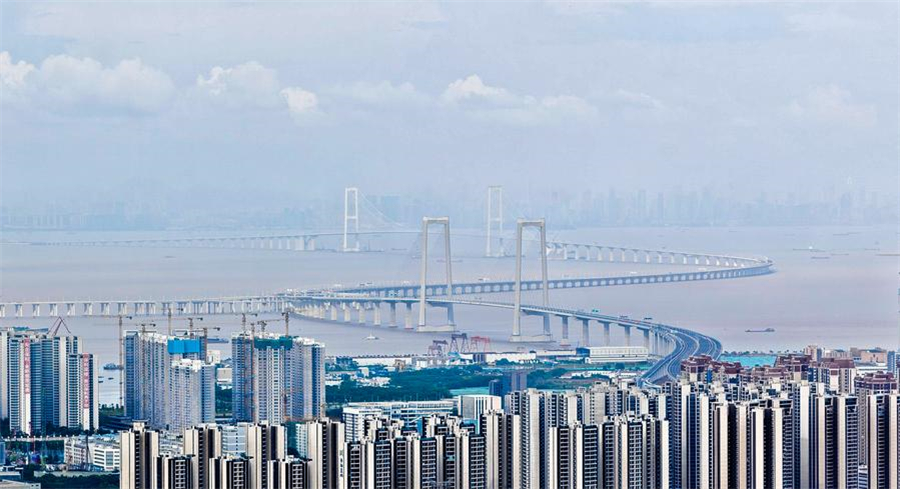
This photo taken on June 19, 2024 shows the Shenzhen-Zhongshan Link in south China's Guangdong Province. [Xinhua/Liu Dawei]
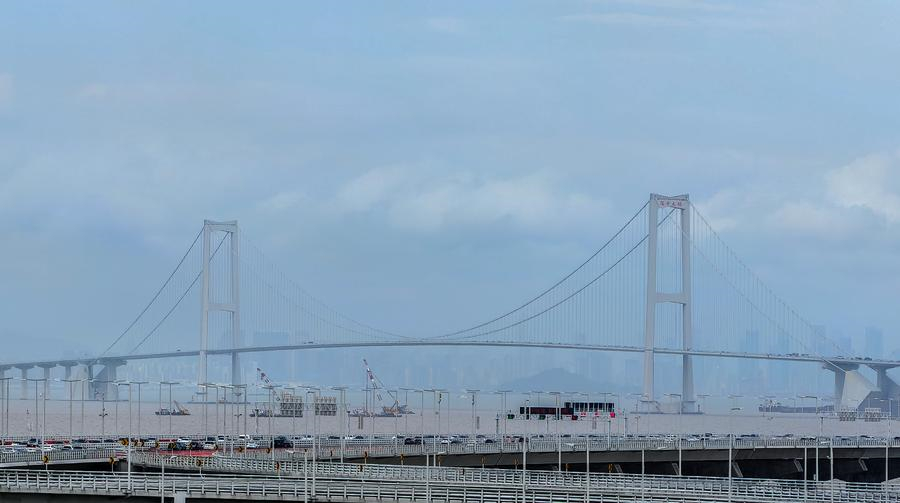
This photo taken on June 30, 2024 shows a view of the Shenzhen-Zhongshan Link in south China's Guangdong Province. [Xinhua/Liu Dawei]
Covering 56,000 square kilometers, the GBA encompasses Hong Kong, Macao and nine cities in Guangdong, and it achieved a total economic output of over 14 trillion yuan (around 1.96 trillion U.S. dollars) in 2023. China aims to develop the area into a world-class city cluster, a global technology and innovation center, and a livable, business-friendly location.
With an estimated cost of 44.69 billion yuan, the Shenzhen-Zhongshan Link features eight lanes designed for speeds of up to 100 kilometers per hour.
It is considered one of the world's most challenging cross-sea cluster projects to have been built. Over 10,000 workers overcame obstacles such as frequent typhoons, high salinity, humidity and severe siltation during the course of its seven-year construction.
The project set multiple world records in areas such as suspension bridge engineering, tunnel construction, and underwater highway interchanges.
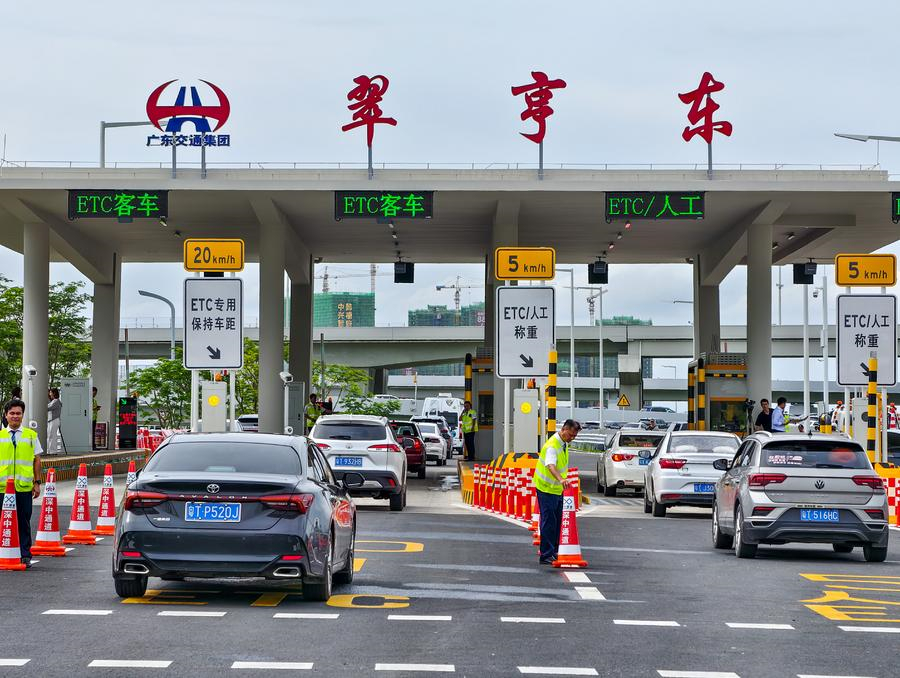
Vehicles are seen at a toll station of the Shenzhen-Zhongshan Link in south China's Guangdong Province, June 30, 2024. [Xinhua/Liu Dawei]
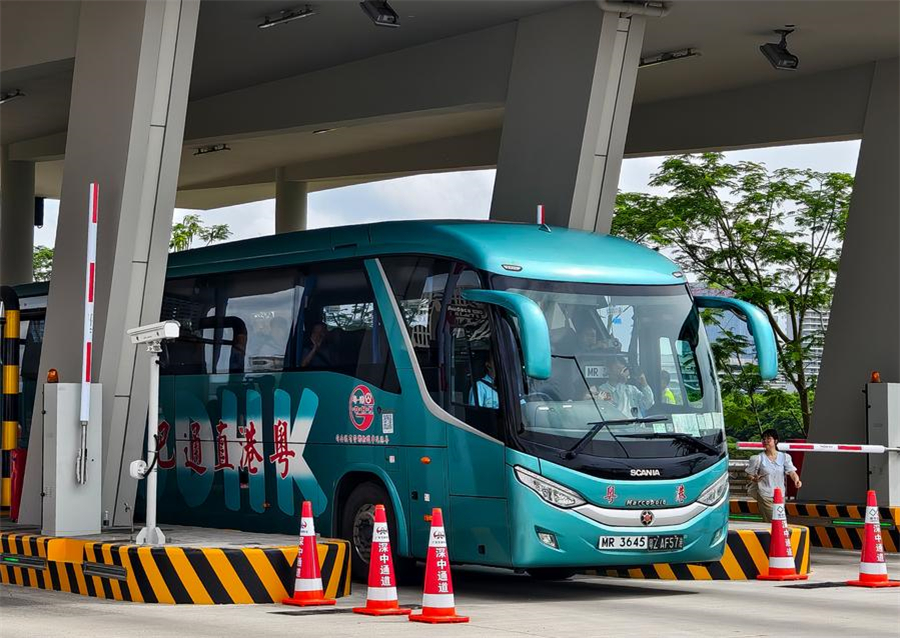
A coach passes a toll station of the Shenzhen-Zhongshan Link in south China's Guangdong Province, June 30, 2024. [Xinhua/Liu Dawei]
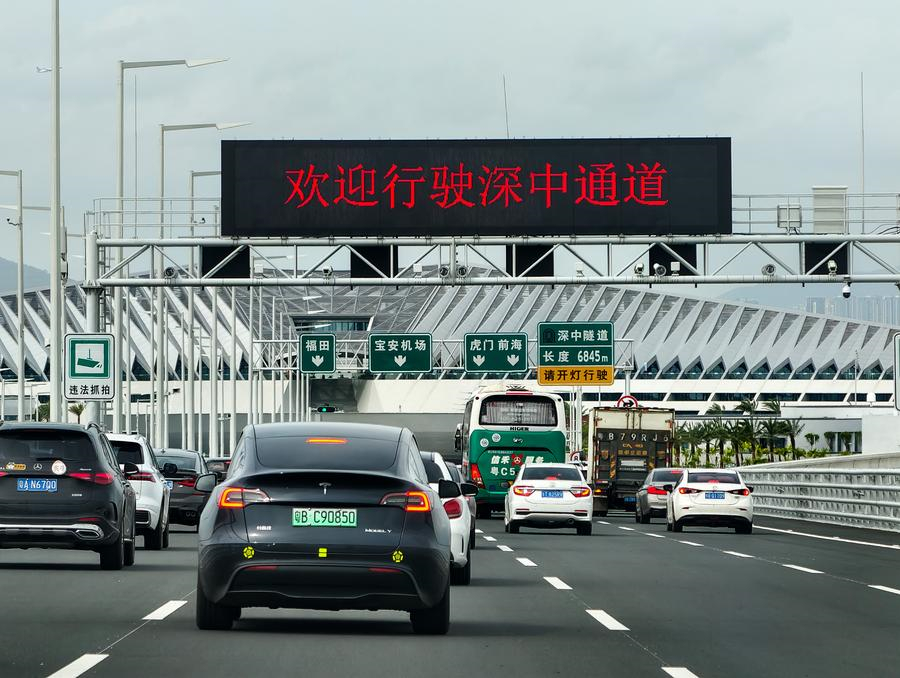
Vehicles drive in the west artificial island section of the Shenzhen-Zhongshan Link in south China's Guangdong Province, June 30, 2024. [Xinhua/Liu Dawei]
Experts say the new link will enhance regional development and competitiveness, bridging the economic gap between the eastern and western shores of the Pearl River Estuary and facilitating leisure travel.
The east bank excels in advanced manufacturing and technological innovation but faces space limitations and rising costs. The west bank, on the other hand, requires industrial transformation and upgrading to boost its economic vitality.
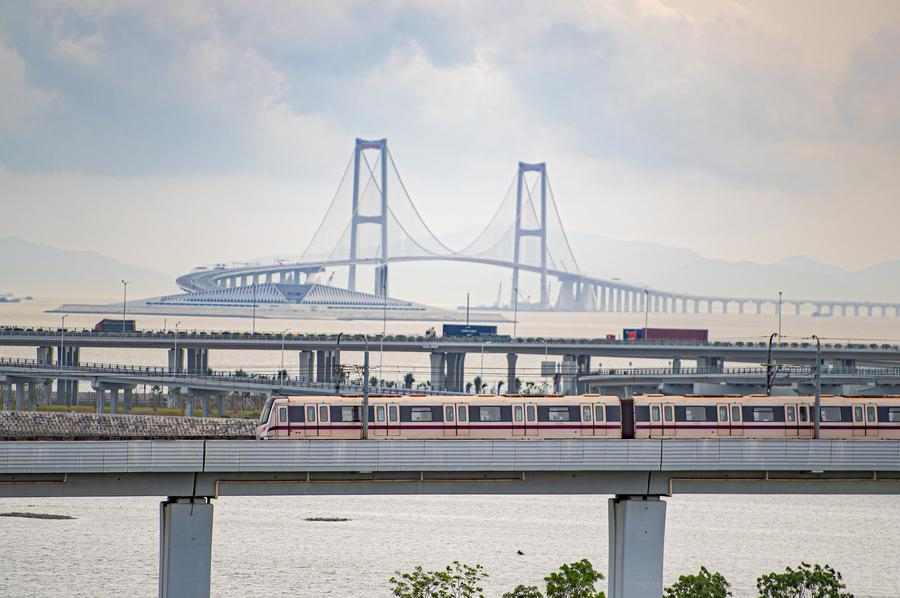
This photo taken on June 19, 2024 shows the Shenzhong Bridge and the west artificial island of the Shenzhen-Zhongshan Link [back] in south China's Guangdong Province. [Xinhua/Mao Siqian]
"The new transport link is a golden avenue for us, cutting the travel time between our R&D center in Shenzhen and our factory in Zhongshan to half an hour," said Yuan Moli, an employee of Shenzhen Xinyichang Technology Co., Ltd.
Business expansions have seen many Shenzhen-based companies, including Xinyichang, establish factories in Zhongshan, necessitating frequent travel between the two cities.
Home to over 17 million people and numerous leading tech companies like Huawei, Tencent and BYD, Shenzhen is known as "China's Silicon Valley."
Meng Fanli, Party secretary of Shenzhen, said the city will introduce more initiatives to facilitate travel for residents of both cities, streamlining flows of people, goods, information and capital.
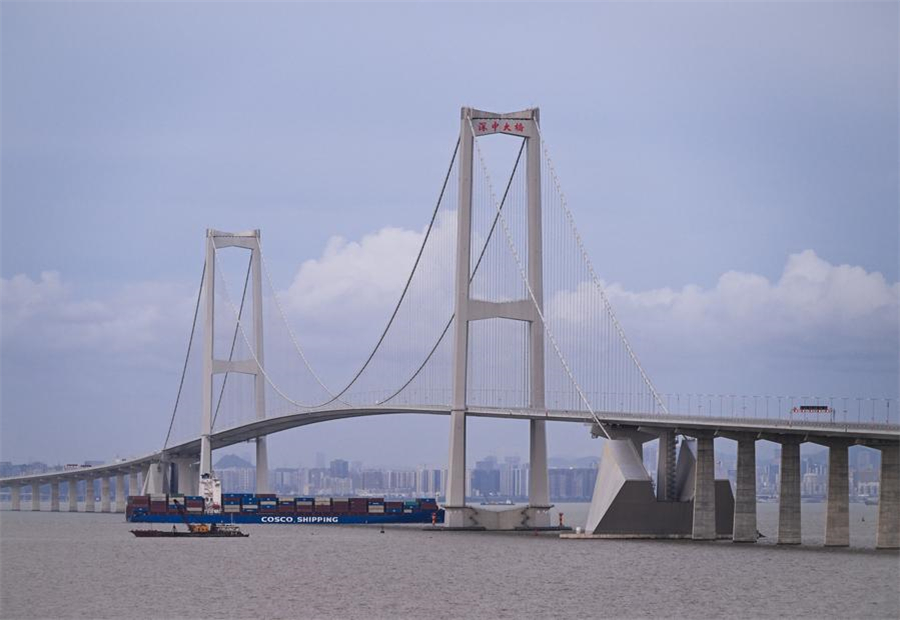
This photo taken on June 29, 2024 shows the Shenzhong Bridge of the Shenzhen-Zhongshan Link in south China's Guangdong Province. [Xinhua/Liu Dawei]
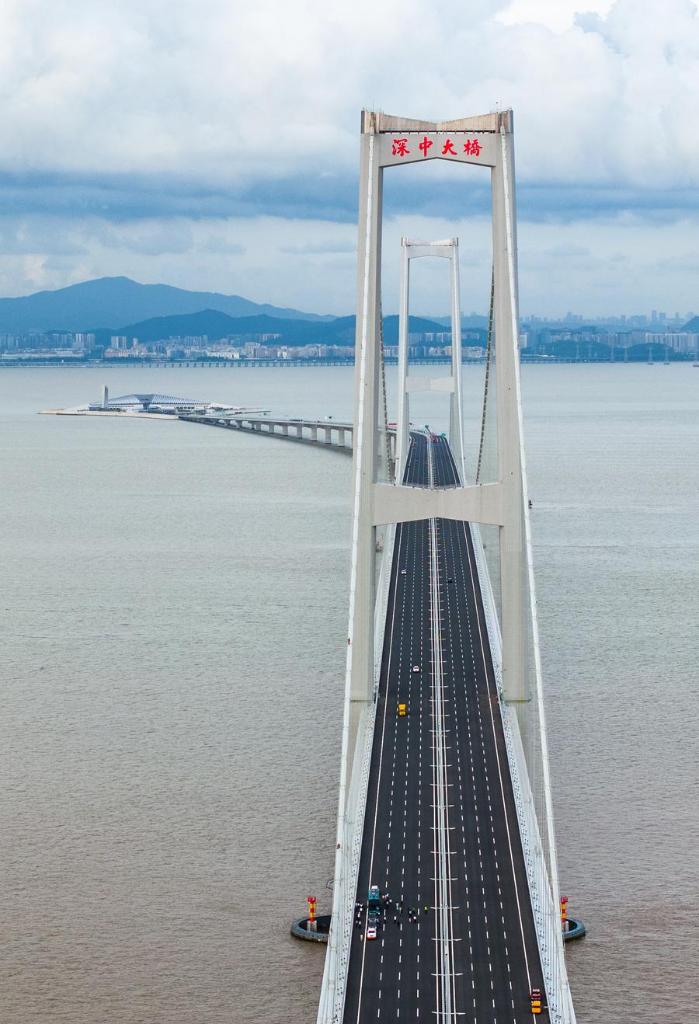
An aerial drone photo taken on June 27, 2024 shows the Shenzhong Bridge of the Shenzhen-Zhongshan Link in south China's Guangdong Province. [Xinhua/Mao Siqian]
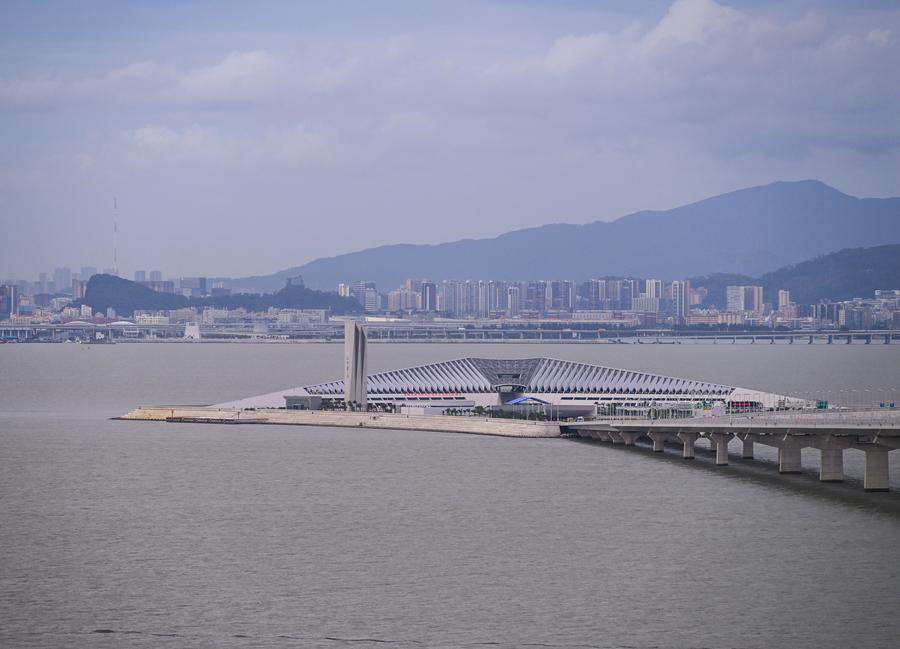
This photo taken on June 29, 2024 shows the west artificial island of the Shenzhen-Zhongshan Link in south China's Guangdong Province. [Xinhua/Liu Dawei]
Shenzhen and Zhongshan will collaborate to build a world-class advanced manufacturing cluster, develop modern services industries, and accelerate the establishment of a future-oriented modern industrial system, Meng added.
The tourism sector is also eyeing the opportunities brought by decreased travel times.
Huang Chuping, assistant general manager of a Shenzhen-based travel agency, is anticipating the "super traffic" the link will bring.
His team has been planning new tourism products since last year and has already launched over 10 extensive tourism routes in western Guangdong to positive responses, he told Xinhua.
Huang's optimism was echoed by Chen Wenfei, vice president and secretary general of the tourism industry association in Jiangmen City, which is also part of the GBA.
"We have already coordinated with many travel agencies to attract more tourists from Shenzhen, Hong Kong and Macao to Jiangmen," Chen said.
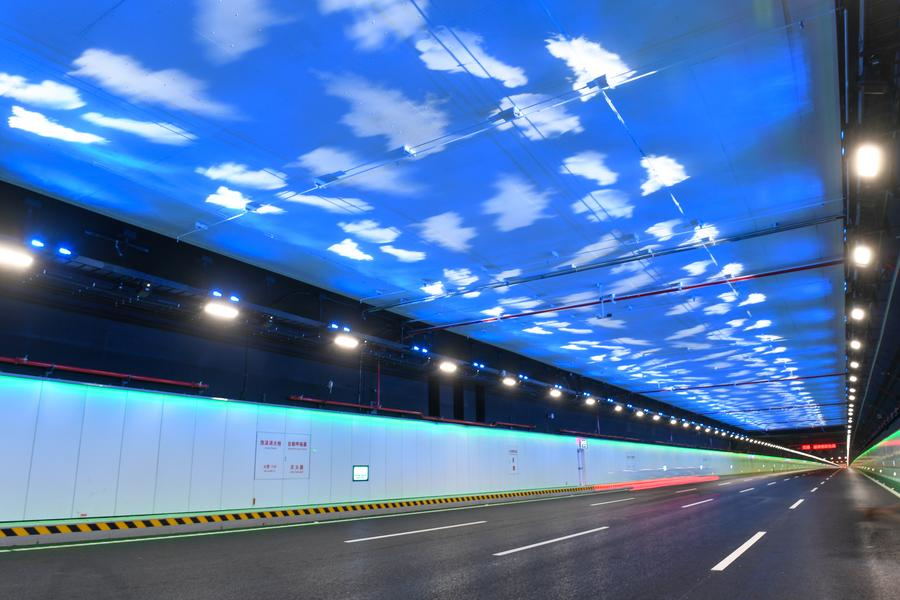
This photo taken on June 27, 2024 shows the underwater tunnel of the Shenzhen-Zhongshan Link in south China's Guangdong Province. [Xinhua/Mao Siqian]

An aerial drone photo taken on June 27, 2024 shows the Shenzhen-Zhongshan Link at sunrise in south China's Guangdong Province. [Xinhua/Mao Siqian]
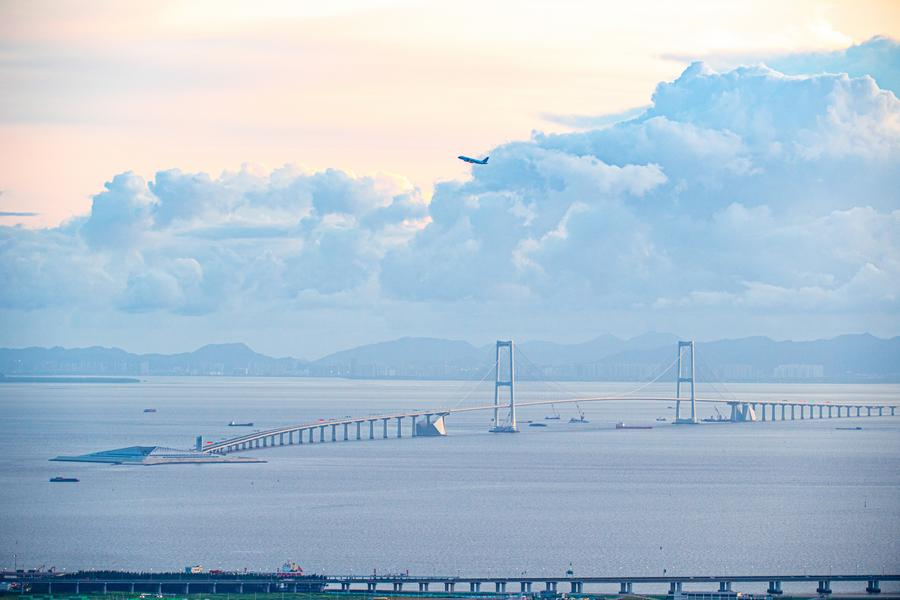
An aircraft flies over the Shenzhen-Zhongshan Link in south China's Guangdong Province, June 23, 2024. [Xinhua/Mao Siqian]
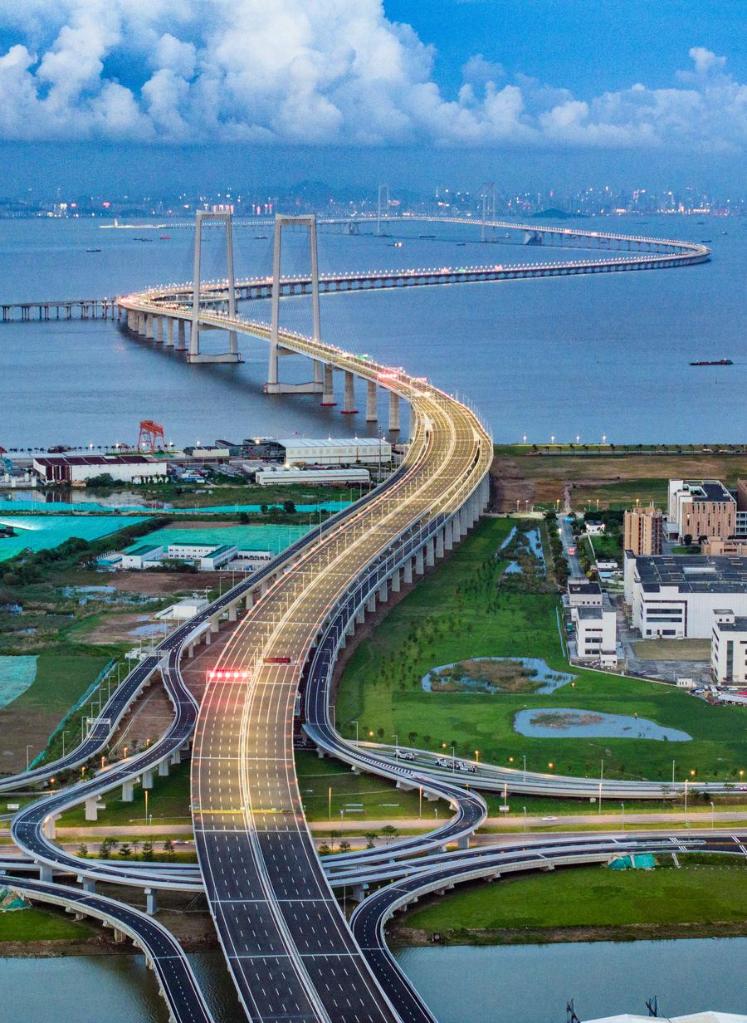
An aerial drone photo taken on June 27, 2024 shows the Shenzhen-Zhongshan Link in south China's Guangdong Province. [Xinhua/Mao Siqian]
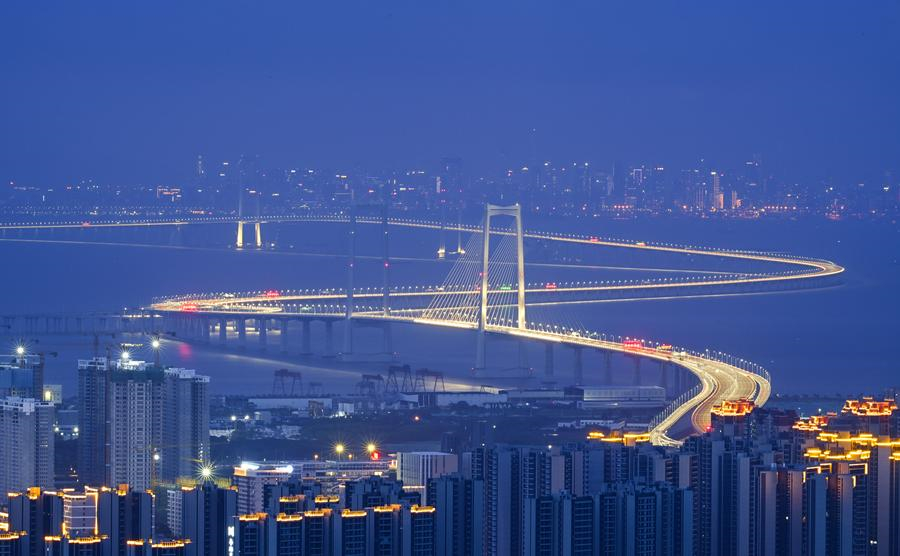
This photo taken on June 19, 2024 shows a night view of the Shenzhen-Zhongshan Link in south China's Guangdong Province. [Xinhua/Liu Dawei]
Video reporters: Ye Qian, Liu Dawei, Mao Siqian, Deng Hua
























